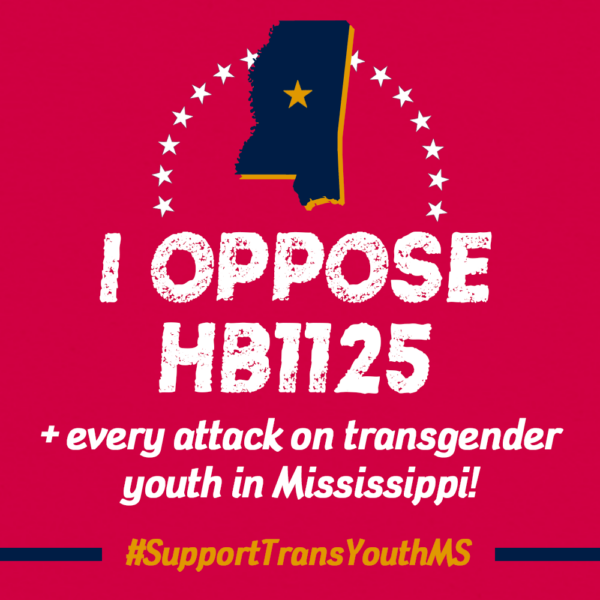 Today the Mississippi Senate voted in favor of HB1125, a bill that prohibits transgender-related healthcare in Mississippi for people under the age of 18. This means that care such as gender-affirming hormone therapy and puberty blockers would be inaccessible for any trans person 17 and younger. The bill now heads to the desk of Governor Tate Reeves. If he signs, it will take effect immediately.
Today the Mississippi Senate voted in favor of HB1125, a bill that prohibits transgender-related healthcare in Mississippi for people under the age of 18. This means that care such as gender-affirming hormone therapy and puberty blockers would be inaccessible for any trans person 17 and younger. The bill now heads to the desk of Governor Tate Reeves. If he signs, it will take effect immediately.
So far this year Utah and South Dakota have passed similar anti-transgender laws, joining previously-passed laws in Alabama and Arkansas, which are both currently on hold by court orders.
Advocates have presented next steps for the LGBTQ+ community of Mississippi:
- Impacted youth and families last month joined a Community Town Hall where advocates shared insight on the law, steps for how to prepare for the bill’s passage, and resources for healing and resilience during this traumatic time. A resource guide is available here.
- Emergency grants are available from the Mississippi Rising Coalition’s Rainbow Mutual Aid Fund. Impacted families of trans youth can apply for these funds to support them through this challenging time.
- Advocates are urging Governor Reeves to veto HB1125.
- A public rally and protest against HB1125 and demonstration in support of transgender youth was held on February 15.
Jensen Luke Matar (he/him pronouns), Executive Director of The TRANS Program, said:
“Mississippi lawmakers are insisting that they know what’s best for transgender youth and ignoring the recommendations of every major medical association. Patients, along with their health care providers – not politicians – should decide what medical care is in the best interest of a patient. I know from years of working directly with trans youth in Mississippi that they need support, love, and affirmation – not this brazen political attack that cuts off their access to life-saving care.”
Mickie Stratos (they/them pronouns), President of The Spectrum Center of Hattiesburg, said:
“Mississippi legislators are positioning HB1125 as a measure to protect kids, when the reality is that this bill will do the exact opposite. Access to gender affirming medical care is a top indicator of healthy and positive outcomes for trans people. To criminalize that care is a direct assault on the physical, emotional, and mental health of trans youth, and we will see negative outcomes for our trans youth and their families in MS as a result. Regardless of the outcome of this legislation, we will remain here in Mississippi to support, affirm, love, and care for the trans folks and their families impacted by this attack.”
Lea Campbell (she/her pronouns), President of the Mississippi Rising Coalition, added:
“My heart breaks for trans youth and all of their loved ones who are being targeted by this heinous attack on their dignity and access to basic healthcare. We are eager to support, with the financial, emotional, and logistical toll of this bill’s passage and we urge the families of trans young people to get in touch with the coalition for support.”
Rob Hill (he/him pronouns), State Director of Human Rights Campaign Mississippi, said:
“Politicians who don’t have an ounce of medical training are interfering with our rights as parents and acting as if they know how to raise and support our children better than we do. Attacking LGBTQ+ Mississippians will not solve any problems or make life easier for working folks in this state. The only thing it will accomplish is to further demonize and alienate transgender kids who are already among our most vulnerable students. Mississippi deserves better.”
Stacie Pace, PhD, MSN, ACNP, AGNP, CCTS-I (she/her/they pronouns) of Spectrum: The Other Clinic, said today:
“No children are undergoing surgeries in this state. There are not even options for bottom (genital) surgeries for adults in this state. And anyone under 18 who is placed on gender-affirming medication undergoes a thorough and lengthy multidisciplinary evaluation prior to ever reaching the point of taking medication, during which time parents are always involved. Multiple national and international medical organizations have created standards of care and guidelines based on decades of solid research for transgender people of all ages. Therefore, it is unclear to us where anti-trans lawmakers are getting the idea that more research needs to be done. This problem they perceive with trans youth getting procedures done simply doesn’t exist and is a smoke screen easily cleared up by speaking with those who work with this population regularly.”
Ivy Hill (they/them pronouns), Director of Gender Justice for the Campaign for Southern Equality, said:
“This bill – and an overwhelming wave of similar legislation moving quickly in states across the country – is cruelly targeting transgender youth and their doctors. To every trans young person who feels attacked, marginalized, or fearful for the future: Please know that you are loved, you are supported, and there is queer community across the state and nationwide who care about you and are joining with you in solidarity.”
Sybastian Smith (he/him pronouns), Organizing Director at the National Center for Transgender Equality, said:
“Governmental overreach has a tangible and lasting effect on many marginalized communities. People seek medical care from doctors, not politicians. All people, especially our youth, deserve access to the health care they need in order to live safe and healthy lives, including transgender people. Contrary to the misinformed arguments of anti-trans advocacy efforts, transition related healthcare is safe, effective, scientifically supported, and medically necessary.”
Data from The Williams Institute show that at least 99,000 LGBTQ+ people above the age of 16 live in Mississippi. Around 13,500 adults in Mississippi identify as transgender.

